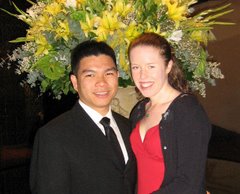The Calculus of Love
 I just read this funny article entitled "The Calculus of Saying 'I Love You'" by Anna Gosline. In the article, she supposes that women should never date a man who knows more math than them, but as a happily married man with a math degree from UC Berkeley, I'm a bit perturbed by this.
I just read this funny article entitled "The Calculus of Saying 'I Love You'" by Anna Gosline. In the article, she supposes that women should never date a man who knows more math than them, but as a happily married man with a math degree from UC Berkeley, I'm a bit perturbed by this.
The article is based on a statement the boyfriend of the author's friend made stating he would say he loved her when dLove/dt = zero. The author and her friend went into length and even have graphs to ultimately prove that the the boyfriend's statement is misguided. They even suggest a better solution to the problem. Kudos to you girls!
However, this is where my beef with the author's supposition lies. By fact that the author and her friend had to go through so much work to debunk the boyfriend's statement and come up with another solution is evidence that said boyfriend is, in fact, less smarter than the girls in math and does not necessarily know more math than the girls. If he were to know more math than his girlfriend, he should have come up with the better solution proposed by the girls in the first place. Thus, the girlfriend would be better off dating a man who knows more math than her in the first place if she were to save herself all this grief and research to point out the boyfriend's original error. Therefore, the author's supposition is incorrect; women should always date men who know more math than them.







1 comment:
The Engineer (the boyfriend in the story) probably meant that he'd say "I love you" when they reach steady state (steady state means d(anything)/dt = 0), when his love for her would be unchanging with time. Something like that.
I'm not a fan of d(love)/dt = 0 because love shouldn't stagnate like that.
I'm not a huge fan of the girls' reasoning, either. But that d2(love)/dt2 > 0 bit was funny!
Post a Comment